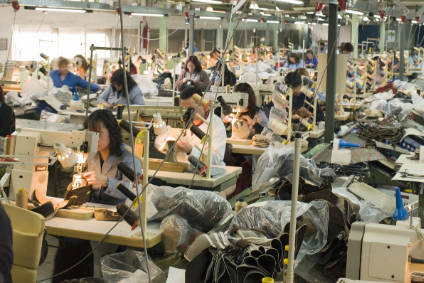
Apparel brands and retailers – including Adidas, C&A, H&M Group, Inditex, M&S and Primark – have joined employer organisations, unions and the International Labour Organization (ILO) to push for emergency funding to support garment factories and workers through the Covid-19 pandemic.
The initiative also involves PVH Corporation, Ralph Lauren, Tchibo, VF Corporation, Under Armour and Zalando, as well as the International Organisation of Employers (IOE), the International Trade Union Confederation (ITUC), IndustriAll Global Union, Bangladesh Employers’ Federation and the International Apparel Federation (IAF).
The organisations have endorsed a statement, ‘Covid-19: Action in the Global Garment Industry,’ that commits them to working with governments and financial institutions to mobilise sufficient funding to enable manufacturers to ensure business continuity including payment of wages.
This will include accelerating access to credit, unemployment benefits and income-support, no or low-interest short-term loans, tax abatement, duty deferral, fiscal stimulus, and others forms of support.
They say support is also needed to enhance social protection schemes and preserve jobs, such as tax packages or social security charges and temporary unemployment programmes.
Brands and retailers endorsing the statement have pledged to pay manufacturers for finished goods and goods in production; maintain quick and effective open lines of communication with supply chain partners about the status of business operations and future planning. Direct support to factories can also be considered should financial circumstances permit.

US Tariffs are shifting - will you react or anticipate?
Don’t let policy changes catch you off guard. Stay proactive with real-time data and expert analysis.
By GlobalData“We do not know how long it will be until the demand for garments returns, in what form, scope and scale garment value chains will resume operations, and when manufacturing may resume in safe working conditions,” the groups say.
“We do know that many manufacturers in the industry are not resilient enough to survive this crisis. Factories are already beginning to close and workers are being laid off and furloughed. We must act to protect workers and employers during this period so that manufacturers remain viable and able to bring workers back to work during the recovery.”
Devastating impacts
Garment factories around the world have shut down at an alarming rate as retailers have closed shops and cancelled orders – with devastating impacts for millions of garment workers.
“The economic impact of the Covid-19 pandemic on this critical industry requires a global response,” explains IOE secretary-general Roberto Suárez Santos.
“This is a voluntary initiative that focuses on mobilising collective action. It is not aiming to disregard stakeholders, companies and organisation that might not be able to join.”
ITUC general secretary Sharan Burrow adds: “We cannot afford the human and economic devastation of the collapse of our global supply chains and millions more in developing economies thrown back into poverty.”
Emanuel Chirico, chairman and CEO of PVH Corporation, says: “We recognise that tackling this is far bigger than just one business and requires a collaborative industry response.
“We must work together as brands, governments, and representatives for workers as well as employers to establish a more just and resilient garment industry that is better equipped to deal with both the human and business impacts of Covid-19 and any future crises.”
ILO director-general Guy Ryder notes: “This is an unprecedented crisis that can only be solved through global solidarity. The priority must be to sustain businesses and protect workers.
“At the heart of this is effective social dialogue between governments, workers’ and employers’ organizations. We urge all actors to heed this this call and take joint action that will help us avert catastrophe for the industry.”
An international working group will be established within the next two weeks to further elaborate the implementation steps necessary to deliver on these commitments.
The Worker Rights Consortium emphasises the joint statement should be seen as an initial step, not a comprehensive solution or concrete plan of action.
It also notes that because support in the form of mobilisation of public resources from international bodies “will constitute a public rescue of private supply chains, it is incumbent upon brands and retailers to pay their share.
“Brands and retailers should move promptly to negotiate enforceable commitments with global union bodies to pay higher prices for product in the future to fund stronger social protections for workers, so that the extreme vulnerability of workers in the current crisis is never repeated.”
It also notes: “Beyond the immediate action necessary to help workers survive the crisis, fundamental reform of sourcing and pricing practices is essential.”
A full version of the call to action is available at the following link: Covid-19: Joint Call for Action for the Garment Industry.
Textile, apparel, footwear and travel goods trade associations from around the globe are adding to calls for governments to address the liquidity squeeze caused by Covid-19 across the supply chain.
And a coalition of labour rights groups representing around 2,000 garment brands and retailers has separately set out its priorities to protect garment workers during the Covid-19 crisis – including safeguarding worker income and health, and future-proofing supply chains.




